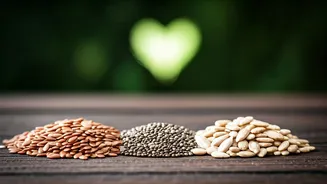Chia Seeds' Potential
Chia seeds, tiny but mighty, are a fantastic addition to your diet. They are loaded with soluble fiber, a key component for lowering LDL cholesterol (the
'bad' kind). When soluble fiber is consumed, it binds to cholesterol in your digestive system, preventing its absorption. This action helps eliminate excess cholesterol from the body. Moreover, chia seeds also provide omega-3 fatty acids, which further assist in promoting heart health. You can easily sprinkle chia seeds on your morning oatmeal, add them to smoothies, or use them as a topping for salads and yogurt. These versatile seeds offer a convenient and effective way to enhance your cardiovascular well-being, and they also contribute to improved blood sugar control and satiety.
Flaxseed: Omega-3 Power
Flaxseeds are another excellent source of omega-3 fatty acids, particularly alpha-linolenic acid (ALA), a precursor to the beneficial EPA and DHA found in fish oil. The ALA in flaxseeds helps reduce inflammation in the body and can help prevent the build-up of plaque in arteries. Flaxseeds also contain lignans, which act as antioxidants and can help protect the heart from damage. Consuming flaxseeds is straightforward: grind them to increase the absorption of nutrients, and then incorporate them into your meals. Consider adding flaxseed to baked goods, cereal, or even mixing it into your favorite recipes. Regular intake of flaxseed is linked to reduced blood pressure and improved overall heart function, making it a valuable seed for a healthy diet.
Sunflower Seeds' Benefits
Sunflower seeds are a great source of vitamin E, a potent antioxidant that helps protect against cellular damage. Vitamin E helps to prevent the oxidation of LDL cholesterol, which can contribute to the formation of plaque in arteries. These seeds also contain magnesium, which helps regulate blood pressure. Magnesium encourages blood vessel relaxation, allowing for improved blood flow. The nutrients found in sunflower seeds work together to promote a healthy heart and reduce the risk of cardiovascular diseases. To enjoy sunflower seeds, incorporate them as a snack, add them to salads, or use them as a topping on various dishes. A handful of sunflower seeds provides a tasty and effective way to support your heart health.
Pumpkin Seeds: Zinc Boost
Pumpkin seeds are packed with zinc, an essential mineral that aids in maintaining healthy blood vessels and supports overall heart function. Zinc contributes to the body's natural defense against oxidative stress. Furthermore, these seeds have phytosterols, compounds that can block the absorption of cholesterol. The phytosterols act as a natural barrier in the gut, helping to reduce the amount of cholesterol absorbed into the bloodstream. Pumpkin seeds are incredibly versatile; they can be roasted, eaten raw, or added to various recipes. Consider using pumpkin seeds in trail mixes or sprinkling them over soups and salads. Their rich nutrient profile makes them a valuable addition to any heart-healthy diet.
Hemp Seeds' Advantages
Hemp seeds provide a balanced ratio of omega-3 and omega-6 fatty acids, which is essential for heart health. This balance helps to reduce inflammation in the body and maintain healthy blood vessels. Hemp seeds are also rich in arginine, an amino acid that converts to nitric oxide. Nitric oxide helps relax and widen blood vessels, promoting healthy blood flow and further reducing blood pressure. Hemp seeds can be consumed by sprinkling them on salads, blending them into smoothies, or incorporating them into your daily cooking. Their mild, nutty flavor makes them a versatile and nutritious addition to any meal, enhancing both the taste and nutritional value of your diet.
Sesame Seeds' Role
Sesame seeds are packed with lignans, similar to those found in flaxseeds, which are known for their antioxidant properties. These lignans help protect against the oxidation of LDL cholesterol and reduce arterial plaque buildup. Sesame seeds also contain magnesium, an important mineral for regulating blood pressure, and are a good source of fiber, which helps lower cholesterol levels. Sesame seeds provide a subtle, nutty flavor that makes them an excellent addition to many dishes. They can be toasted and sprinkled on salads, used in baking, or added to stir-fries. Incorporating sesame seeds regularly into your diet will add valuable nutrients and flavors to your meals while supporting heart health.











![[WATCH] T20 World Cup 2026: Gautam Gambhir hosts dinner for Team India players ahead of Namibia clash](https://g-mob.glance-cdn.com/public/fc/image/7gXS1xdhs5Q0.webp)



